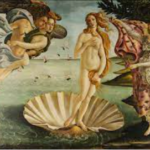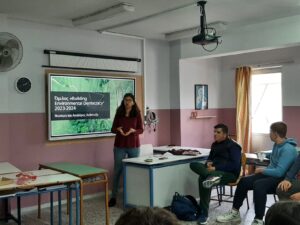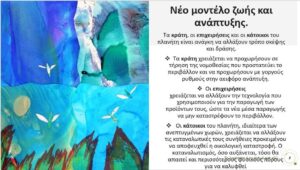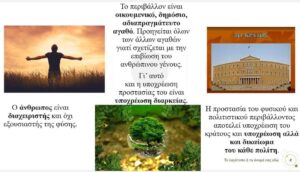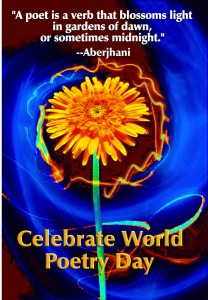
Παρακολούθηση επιμορφωτικού σεμιναρίου με θέμα την Περιβαλλοντική Εκπαίδευση από καθηγητές του Πειραματικού Γενικού Λυκείου Ρεθύμνου Π.Κ.
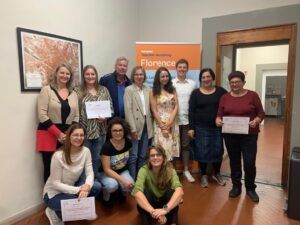
Αυτή τη φράση που ανήκει στον αρχαίο νομοθέτη Σόλωνα, έναν από τους επτά σοφούς, και την οποία χρησιμοποιούσε για να τονίσει ότι η μάθηση δεν σταματά στις εγκύκλιες σπουδές, αλλά συνεχίζεται σε όλη τη ζωή του ατόμου, έχει ενστερνιστεί η σχολική κοινότητα του Πειραματικού Λυκείου που είναι πάντα πρόθυμη ν’ ανοίξει τους ορίζοντές της, να εξελιχθεί και να διαπρέψει σε ποικίλους τομείς.
Έτσι, στο πλαίσιο του Ευρωπαϊκού Προγράμματος Erasmus+ με τίτλο “Go Green – Safe Screen” και κωδικό αριθμό 2022-1-EL01-KA122-SCH-000075677, δύο καθηγήτριες της σχολικής μονάδας, οι κκ. Μαρία Καρινιωτάκη, Μαθηματικός, και Αμαλία Χόμπη, Καθηγήτρια Αγγλικής Γλώσσας, παρακολούθησαν σεμινάριο με τίτλο “Environmental Education: Learning and Acting for a Better Future” (Περιβαλλοντική Εκπαίδευση: Μάθηση και δράσεις για ένα καλύτερο αύριο) που διοργάνωσε ο φορέας Europass Teacher Academy στη Φλωρεντία της Ιταλίας από την 16η έως και την 20η Οκτωβρίου 2023.
Κατά την πρώτη μέρα των εργασιών, η εκπαιδεύτρια ενηλίκων, κ. Tamara Slovinská, καλωσόρισε τους συμμετέχοντες, τους ενημέρωσε για το περιεχόμενο του σεμιναρίου και τα αναμενόμενα μαθησιακά αποτελέσματα, και τους ενέπλεξε σε δραστηριότητες γνωριμίας όπως τα Όνομα και Κίνηση και Ανθρώπινο Bingo.Στη συνέχεια, έγινε η παρουσίαση των σχολείων των συμμετεχόντων που βρίσκονται στη Γερμανία, Ελλάδα, Κροατία και Σλοβακία και των διαφόρων δραστηριοτήτων τους. Ακολούθησαν δύο εργαστήρια σχετικά με την κλιματική αλλαγή και τον προβληματισμό που προκαλεί στη διεθνή κοινότητα στα οποία οι εκπαιδευτικοί κλήθηκαν ν’ αναζητήσουν τις αιτίες και να παρουσιάσουν την τωρινή κατάσταση και τις επιπτώσεις της.
Κατά τη δεύτερη μέρα, οι επιμορφούμενοι ασχολήθηκαν τόσο με την Επιστήμη που σχετίζεται με την κλιματική αλλαγή και τις επιπτώσεις της σε ατομικό επίπεδο, όσο και με την κλιματική δικαιοσύνη (Climate Justice), έναν όρο που χρησιμοποιείται για να γίνει αναφορά στην υπερθέρμανση του πλανήτη ως ένα πρόβλημα ηθικό και πολιτικό και όχι μόνο περιβαλλοντικό. Στη συνέχεια, συζητήθηκε η Βιώσιμη Ανάπτυξη (Sustainable Development) και τέθηκε το ερώτημα για ποιους είναι βιώσιμη. Τέλος, έγινε μια κριτική προσέγγιση της διδασκαλίας των 17 Στόχων της.
Την τρίτη ημέρα, η ομάδα ασχολήθηκε με τους κοινοτικούς κήπους (community gardens) και αναζήτησε τους λόγους για τους οποίους αυτοί θα μπορούσαν να είναι πολύ ωφέλιμοι. Ακολούθησε επίσκεψη στον κοινοτικό κήπο Orti Dipinti της πόλης, όπου ο κ. Giacomo Salizzoni, υπεύθυνος του σχεδίου, μίλησε για θέματα φυτολογίας, κηπουρικής, διατροφής και βιωσιμότητας, επιτρέποντας στο ακροατήριο να εμβαθύνει τις γνώσεις του.
Την τέταρτη ημέρα, μελετήθηκε το θέμα της βιωσιμότητας (sustainability) και της συστημικής σκέψης (systems thinking), ένα σύνθετο τρόπο συλλογισμού κατά τον οποίο τα πράγματα γίνονται καλύτερα αντιληπτά τοποθετώντας τα μαζί, παρά χωρίζοντάς τα, και ο οποίος χρησιμοποιεί το μοντέλο ενός συστήματος για να ερμηνεύσει τα γεγονότα. Στα εργαστήρια που ακολούθησαν εξετάστηκε το θέμα της κρίσης των πλαστικών και οι συνέπειες μιας τέτοιας ρύπανσης και οι επιμορφούμενοι κλήθηκαν να παρουσιάσουν πιθανές λύσεις του προβλήματος και δράσεις που επιβάλλεται να γίνουν τόσο σε ατομικό όσο και σε συλλογικό επίπεδο. Εκτός από αυτά, έγινε εκτενής συζήτηση σχετικά με τη «Γρήγορη Μόδα» (Fast Fashion), όρος που αναφέρεται στην πρακτική των εταιρειών να φτιάχνουν ρούχα και αξεσουάρ που ανταποκρίνονται άμεσα στις τρέχουσες τάσεις της μόδας, ακολουθώντας την πιο οικονομική και αποδοτική διαδικασία παραγωγής, και την επίδρασή της σε περιβάλλον και ανθρώπους.
Την τελευταία ημέρα, μελετήθηκαν τα θέματα της διαδικασίας μετάδοσης ψευδούς εντύπωσης ή παραπλανητικών πληροφοριών σχετικά με το πώς τα προϊόντα μιας εταιρείας είναι φιλικά προς το περιβάλλον (Greenwashing), του σχεδιασμού διαφόρων ειδών δράσεων για το κλίμα από τους μαθητές και των τρόπων διευκόλυνσης των συνακόλουθων εκστρατειών τέτοιων δράσεων. Ακολούθησε η σύνοψη και η αξιολόγηση του σεμιναρίου και η απονομή των βεβαιώσεων.
Όμως, η απόκτηση νέας γνώσης, η οποία θα αξιοποιηθεί στον Όμιλο Building Environmental Democracy και περιλαμβάνεται στο Padlet Environmental Education: Learning and Acting for a Better Future (https://padlet.com/EUROPASS22/environmental-education-learning-and-acting-for-a-better-fut-rjpizr6dqlsrye5r), δεν ήταν ο μοναδικός στόχος του σεμιναρίου. Η δικτύωση και η ανταλλαγή απόψεων και ιδεών από εκπαιδευτικούς διαφορετικών χωρών, βαθμίδων εκπαίδευσης και ειδικοτήτων βοήθησε πολύ στην επαγγελματική εξέλιξη και την καλλιέργεια της διαπολιτισμικής συνείδησης, και αποτέλεσε έναυσμα μελλοντικών συνεργασιών στον τομέα των σχολικών συμπράξεων.
Τέλος, ας συμειώσουμε ότι το σεμινάριο πραγματοποιήθηκε στη Φλωρεντία, την ιταλική πόλη που προκαλεί δέος στους επισκέπτες με την ανείπωτη ομορφιά της, κι εκείνη στην οποία ο χρόνος έχει για πάντα σταματήσει στην περίοδο της Αναγέννησης, σ’ έναν κόσμο ιδανικά ζωγραφισμένο από τα χέρια του Botticelli, σε μία εποχή καλυμμένη με περίτεχνες νωπογραφίες, μπαρόκ και αρχιτεκτονικά θαύματα.

